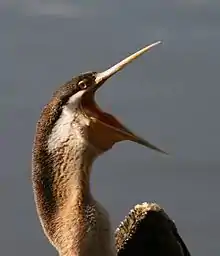beak
English
Etymology
From Middle English bec, borrowed from Anglo-Norman, from Latin beccus, from Gaulish *bekkos, from Proto-Celtic *bekkos (“beak, snout”), possibly from Proto-Indo-European *bak-, *baḱ- (“pointed stick, peg”). Cognate with Breton beg (“beak”). Compare Saterland Frisian Bäk (“mouth; muzzle; beak”); Dutch bek (“beak; bill; neb”).
Pronunciation
- (UK) IPA(key): /biːk/
Audio (US) (file) - Rhymes: -iːk
Noun
beak (plural beaks)

An Australasian darter (Anhinga novaehollandiae) with her beak wide open
- Anatomical uses.
- A rigid structure projecting from the front of a bird's face, used for pecking, grooming and for eating food.
- A similar structure forming the jaws of an octopus, turtle, etc.
- The long projecting sucking mouth of some insects and other invertebrates, as in the Hemiptera.
- The upper or projecting part of the shell, near the hinge of a bivalve.
- The prolongation of certain univalve shells containing the canal.
- (botany) Any process somewhat like the beak of a bird, terminating the fruit or other parts of a plant.
- Figurative uses.
- Anything projecting or ending in a point like a beak, such as a promontory of land.
- (Can we find and add a quotation of Carew to this entry?)
- (architecture) A continuous slight projection ending in an arris or narrow fillet; that part of a drip from which the water is thrown off.
- (farriery) A toe clip.
- (nautical) That part of a ship, before the forecastle, which is fastened to the stem, and supported by the main knee.
- (nautical) A beam, shod or armed at the end with a metal head or point, and projecting from the prow of an ancient galley, used as a ram to pierce the vessel of an enemy; a beakhead.
- Anything projecting or ending in a point like a beak, such as a promontory of land.
- Colloquial uses.
- (slang) The human nose, especially one that is large and pointed.
- (slang, Britain) A justice of the peace, magistrate, headmaster or other person of authority.
- 1866, Temple Bar: A London Magazine for Town and Country Readers
- Harry looked rather bulky, you know, Tom, and the slop (policeman) says, 'Hallo, what you got here?' and by [blank] he took us both before the beak.
- 2014 January 24, Matthew Norman, “Hercules of the Yard can fix boorish Britain: There's a long list of possible miscreants for the Essex PC who made a splash over a puddle [print version: 25 January 2014]”, in The Daily Telegraph, page 27:
- That an unnamed 22-year-old will be up before the Colchester beak in March under the Road Traffic Act's recherché section 3 – covering inconsiderate driving and with a maximum fine of £5,000 – may at first sight seem a facetious use of court resources.
- 2014 April 12, Christopher Middleton, “Dream home: one of Chelsea's most historic houses is for sale: We deliver our verdict on a London landmark that comes with an impeccable legal pedigree [print version: What price justice? In this case, a cool £14.5m]”, in The Daily Telegraph (Property), London, page P9:
- In 1854, ill health forced Henry [Fielding] to stop running the organisation that later became the Bow Street Runners, London's first professional police force, and John [Fielding] took over. This despite having lost his sight in a naval accident at the age of 19. He was known as the Blind Beak, and was said to be able to recognise as many as 3,000 criminals by their voices alone.
- 1866, Temple Bar: A London Magazine for Town and Country Readers
Derived terms
Translations
structure projecting from a bird's face
|
|
similar structure in an octopus
metal point fixed on the bows of a war galley, used as a ram
slang: human nose — see schnozzle
Verb
beak (third-person singular simple present beaks, present participle beaking, simple past and past participle beaked)
- (transitive) Strike with the beak.
- (transitive) Seize with the beak.
- (intransitive, Northern Ireland) To play truant.
- 2017, Armstrong, Paddy, Life After Life: A Guildford Four Memoir:
- I was living at home at her age, by and large doing what my parents told me, apart from beaking school.
Synonyms
- (play truant): See also Thesaurus:play truant
References
- Ranko Matasović (2009) Etymological Dictionary of Proto-Celtic, →ISBN, page 60
This article is issued from Wiktionary. The text is licensed under Creative Commons - Attribution - Sharealike. Additional terms may apply for the media files.